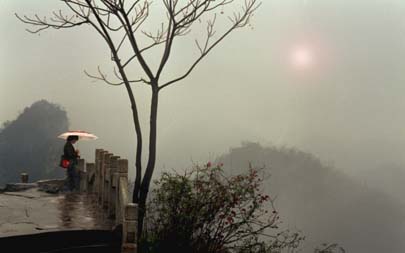  |

Unit 4
Unit
4 |
 English
203:
English
203:
Literature of
the NonWestern World |
Questions:
Chat:
-
Explain
the message in Tu Fu’s “My Thatched Roof”:
“I have lived through
upheavals & ruin/ & have seldom slept very well.”
Explain the ending,
from line 39 on.
-
Explain
Li Po's "Yearning." "Heave the sigh that does no good," why is this?
"The endless yearing/ Crushes a man's heart." What do we (or the
narrator) yearn for? Which of the 3 Chinese outlooks does this poem
illustrate: Confucianism, Daoism, Buddhism? Explain.
-
In
"The Sun Rises & Sets" Li Po writes: "Plants feel no thanks for their
flowering." What does this line mean? Who or what is Li Po
criticizing here?
-
Are
Li Ch'ing-Chao's poems too negative? How do they work for readers
in a Buddhist culture? Compare them to Christian revivalist sermons
or to Dante's Inferno.
-
Li
Ch'ing-Chao writes: "Everything in the world is right; I am wrong" ("Spring
in Wu-ling"). Explain how this is Buddhist. What should she
(or we) do in order not to be wrong? What does the word "wrong" allude
to in Chinese culture?
-
Explain
the difference in response between T'ao Ch'ien & Tu Fu on losing their
houses. T'ao Ch'ien explains his loss "In the Sixth Month of 408,
Fire"; Tu Fu's house is damaged in "My Thatched roof Is Ruined by the Autumn
Wind." Identify each man's outlook.
Short Answers:
When you finish answering the questions,
go to the





